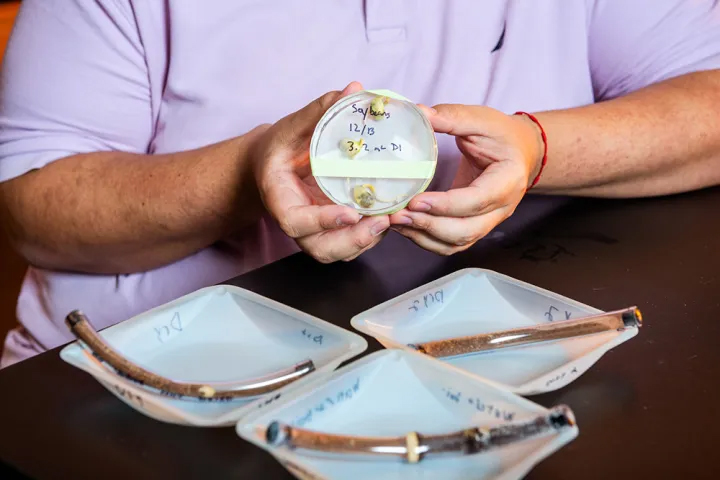Dec. 21, 2022 – A microgravity experiment designed by Collin College students has been selected to fly to the International Space Station aboard a SpaceX commercial supply vehicle in Spring/Summer 2023 as part of Mission 17 of the Student Spaceflight Experiments Program (SSEP).
The experiment, "Does microgravity affect the formation of symbiotic relationships between soy and rhizobium?", will focus on the viability of soybeans as a possible food source and the creation of microplastics on long space voyages. While soybeans sprout in microgravity, rhizobium increases the yield by 66 percent, making the crop much more useful to future astronauts.
Collin College students Henry Elmendorf of Allen and Stefano Sacripanti of Murphy designed the experiment with the guidance of Dr. Tamara Basham, a professor of Environmental Science at the Plano Campus.
 "I think we came up with a very relevant experiment that ties in with past and current
research being done on the International Space Station that could provide valuable
information for future spaceflight missions," Elmendorf said. "I may never work with
NASA or a commercial space agency, but I didn't want to miss the opportunity to have
a project I contributed to get to fly to the ISS. That's just too cool to pass up."
"I think we came up with a very relevant experiment that ties in with past and current
research being done on the International Space Station that could provide valuable
information for future spaceflight missions," Elmendorf said. "I may never work with
NASA or a commercial space agency, but I didn't want to miss the opportunity to have
a project I contributed to get to fly to the ISS. That's just too cool to pass up."
Scientifically-minded students from multiple Collin College campuses, including many participating in the colleges Center for Advanced Studies in Mathematics and Natural Sciences (CASMNS) program, submitted potential experiments for SSEP Mission 17. Other experiments designed by Collin College students that the SSEP considered included Chemical reaction/erosion on a parent rock and Galleria mellonellas Polyethyleneases Pioneers of biodegrading plastic to establish a sustainable space environment. Student artists will participate in a patch design contest commemorating the mission this spring.
About SSEP
The Student Spaceflight Experiments Program (SSEP) is a program of the National Center
for Earth and Space Science Education (NCESSE) in the U.S. and the Arthur C. Clarke
Institute for Space Education internationally. It is enabled through a strategic partnership
with Nanoracks LLC, which is working with NASA under a Space Act Agreement as part
of the utilization of the International Space Station as a National Laboratory.
About Collin College
Collin College serves more than 57,000 credit and continuing education students annually
and offers more than 100 degrees and certificates, including a Bachelor of Science
in Nursing (BSN), a Bachelor of Applied Technology (BAT) in Cybersecurity, and a Bachelor
of Applied Science (BAS) in Construction Management. The only public college based
in Collin County, Collin College is a partner to business, government, and industry,
providing customized training and workforce development. For more information, visitwww.collin.edu.

